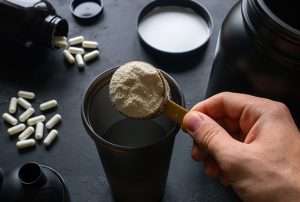Plant Protein Cause Acne?
Introduction
Staying healthy is one of the most important aspects of life today, especially given our sedentary lifestyle and rise of lifestyle diseases.
When trying to stay fit and lean, supplements, especially protein, often become a very integral part of our diet. They are essential amino acids that are required to repair, or even build new muscle tissue.
Why does whey protein cause acne?

Adding a helping of protein powder into a milkshake is quite common and one of the easiest ways to supplement your diet with more proteins.
And if you have been drinking whey protein regularly for some time now, you might have experienced an unintended acne breakout at some point in your life.
That’s because you used dairy to make your shakes – your protein powder or the actual milk you used could be making your face breakout.
Milk contains two proteins: casein and whey. This is what most of the protein powders are made up of.
Whey seems to be the culprit here. It increases the production of a hormone called insulin-like growth factor 1, or IGF-1.
Insulin increases the production of sebum, which in turn results in the development of acne.
If whey protein is causing problems for you, or if you want to avoid dairy products, plant-based or vegan protein powders are an excellent alternative.
Things to keep in mind to avoid acne
There are many other things you can keep in mind to help avoid or deal with acne breakouts:
- Avoid wearing poor quality makeup as that often clog the pores on your skin allowing for the oils to accumulate and form pimples
- Reducing stress I have great benefits as it is one of the primary lifestyle reasons for acne
- Drink enough water daily to ensure your system is cleared and flushed out regularly and there is no accumulation of harmful toxins.
- Avoid excessively high protein diets which contain too many animal and dairy proteins. Try to create a balance between plant based and animal/dairy proteins.
Now, does plant protein cause acne too?

Long story short, No, it does not. Since vegan proteins are completely plant based, they are a safer and healthier alternative to whey protein.
It is much easier for our body to breakdown, and digest plant based protein rather than dairy based ones.
The best plant-based/vegan protein powders don’t contain any heavy metals.
There are various types of plant-based protein powders available in the market today, it’s best to look for something that will still be high protein value.
Seeds, grains, and legumes are the most common sources of plant protein.
Vegan protein powders can come in many forms like:
- Pea protein
- Hemp protein
- Brown rice protein
- Pumpkin seed protein
- Soy protein
They taste more neutral and also don’t have the smell that whey protein often has. And it is definitely the protein powder of choice if you are lactose intolerant.
Plant-based protein powders can help you build lean muscles, is light on the stomach (does not cause you bloating or indigestion), and also keeps your skin clear and healthy.
Does plant protein cause inflammation?

Generally, plant protein does not cause any inflammation. It might in fact be helpful in reducing it.
When you consume something you’re allergic or sensitive to, your body tries to guard itself by releasing antibodies. This triggers your immune system into action and your white blood cells begin producing histamine, a natural compound that increases blood flow, tissue swelling and causes blood vessels to dilate. Altogether, this is known as a tan inflammatory response.
Alos Read: How To Reduce and Prevent Hyperpigmentation
For many people, whey protein triggers inflammatory response symptoms of which might include headache, bloating, hives, nausea, shortness of breath and stuffy nose.
Fortunately, with plant-based protein sources, it is very unlikely to cause any kind of reaction in people sensitive to dairy or soy.
In addition, plant-based proteins are likely to improve your immune system with regular consumption.
Difference between whey and plant-based protein
|
Whey Protein |
Plant Protein |
|
Difficult to digest for lactose-intolerant people |
Easier to digest by the body |
|
More popular with people looking to add muscle |
For people wanting to build lean muscles |
|
Lower nutrient density |
High nutrient density |
|
High nutritional profile |
Low nutritional profile compared to whey protein |
Are there any negative side-effects of plant-based protein?
There are practically no side effects of plant protein when you use the right amount. If you are concerned about the quality of the protein, check for the ingredients before buying your product.
You should check to see if the ingredients are natural and non-GMO. Also, ensure that you are getting the highest quality of protein.
Look out for any artificial sweeteners, processed additives, and anything that might come in the way of achieving physical fitness. Avoid those powders as they may not be the best choice for you.
The conclusive answer to does plant protein cause acne is No! Try one plant-based protein powder and test it and see if it delivers your desired results or gives you side effects. Ask your friends as well so you’ll know what works for them.
You can also buy our Plix Plant-based protein powder from here:















